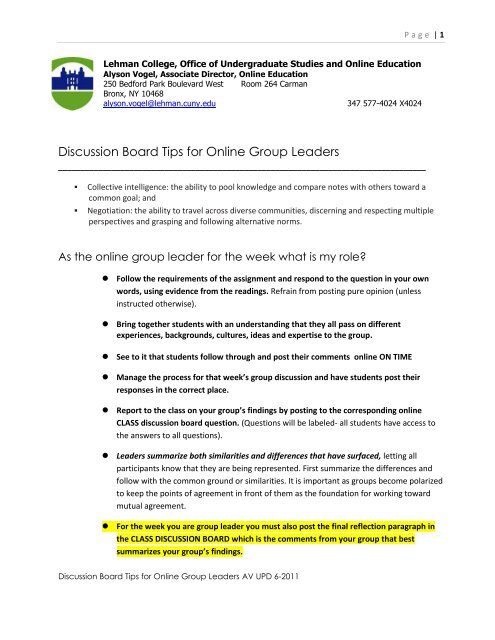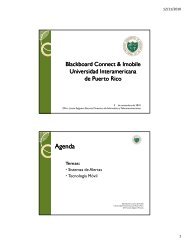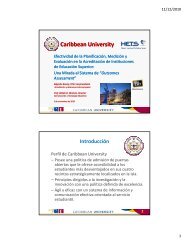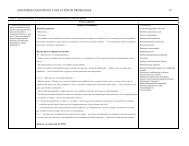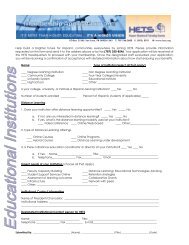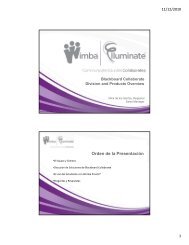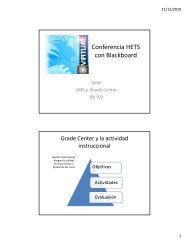Discussion Board Tips for Online Group Leaders - HETS
Discussion Board Tips for Online Group Leaders - HETS
Discussion Board Tips for Online Group Leaders - HETS
You also want an ePaper? Increase the reach of your titles
YUMPU automatically turns print PDFs into web optimized ePapers that Google loves.
Lehman College, Office of Undergraduate Studies and <strong>Online</strong> Education<br />
Alyson Vogel, Associate Director, <strong>Online</strong> Education<br />
250 Bed<strong>for</strong>d Park Boulevard West Room 264 Carman<br />
Bronx, NY 10468<br />
alyson.vogel@lehman.cuny.edu 347 577-4024 X4024<br />
<strong>Discussion</strong> <strong>Board</strong> <strong>Tips</strong> <strong>for</strong> <strong>Online</strong> <strong>Group</strong> <strong>Leaders</strong> AV UPD 6-2011<br />
P a g e | 1<br />
<strong>Discussion</strong> <strong>Board</strong> <strong>Tips</strong> <strong>for</strong> <strong>Online</strong> <strong>Group</strong> <strong>Leaders</strong><br />
___________________________________________________________________________________<br />
Collective intelligence: the ability to pool knowledge and compare notes with others toward a<br />
common goal; and<br />
Negotiation: the ability to travel across diverse communities, discerning and respecting multiple<br />
perspectives and grasping and following alternative norms.<br />
As the online group leader <strong>for</strong> the week what is my role?<br />
Follow the requirements of the assignment and respond to the question in your own<br />
words, using evidence from the readings. Refrain from posting pure opinion (unless<br />
instructed otherwise).<br />
Bring together students with an understanding that they all pass on different<br />
experiences, backgrounds, cultures, ideas and expertise to the group.<br />
See to it that students follow through and post their comments online ON TIME<br />
Manage the process <strong>for</strong> that week’s group discussion and have students post their<br />
responses in the correct place.<br />
Report to the class on your group’s findings by posting to the corresponding online<br />
CLASS discussion board question. (Questions will be labeled- all students have access to<br />
the answers to all questions).<br />
<strong>Leaders</strong> summarize both similarities and differences that have surfaced, letting all<br />
participants know that they are being represented. First summarize the differences and<br />
follow with the common ground or similarities. It is important as groups become polarized<br />
to keep the points of agreement in front of them as the foundation <strong>for</strong> working toward<br />
mutual agreement.<br />
For the week you are group leader you must also post the final reflection paragraph in<br />
the CLASS DISCUSSION BOARD which is the comments from your group that best<br />
summarizes your group’s findings.
<strong>Discussion</strong> <strong>Board</strong> <strong>Tips</strong> <strong>for</strong> <strong>Online</strong> <strong>Group</strong> <strong>Leaders</strong> AV UPD 6-2011<br />
P a g e | 2<br />
DISCUSSION BOARD FORMAT<br />
Students need (and deserve) to feel safe in class discussion and this is even more challenging in<br />
the online environment, where typed messages are easily misinterpreted. The quickest way to<br />
shut down discussion is <strong>for</strong> someone to feel attacked. Student-led discussions are in effect a<br />
conversation, designed to provide a free and relaxed atmosphere <strong>for</strong> discussion, which makes us<br />
all feel uninhibited in asking questions and challenging the statements of others. We all have a<br />
need <strong>for</strong> an honest and respectful environment so please do honor this in our time together.<br />
Each group member including the leaders should<br />
1. Submit his/her own responses to their respective Blackboard groups ON THE DAY THEY<br />
ARE DUE. Subsequent comments can continue on through the week but this is an<br />
extremely short course so late postings will be accepted but not given credit.<br />
2. As mentioned above there is a different group leader <strong>for</strong> each day and he or she is<br />
responsible <strong>for</strong> labeling each DB Question IN THE GROUP DB and <strong>for</strong> choosing the best<br />
responses and posting them in our CLASS DB space. (See group leadership doc under<br />
course in<strong>for</strong>mation in Bb.<br />
(Did you know that more than half of undergraduates feel that the barrier to online discussions is<br />
that there’s too much text on discussion boards? So choosing highlights that will be placed in our<br />
general class discussion board that capture the best responses works to all of our advantage.)<br />
This is a coherent way of finding and reading the best work of each group so there can be a more<br />
free <strong>for</strong>m discussion within your own groups. (See below on Labeling DB questions).<br />
NOTES ON LABELING QUESTIONS and POSTING IN DISCUSSION BOARD:<br />
LEADERS:<br />
For this and all other group <strong>Discussion</strong> <strong>Board</strong> assignments you, as leader, are to create and<br />
number a ‘new thread’ <strong>for</strong> each question in the discussion board within your specific group with<br />
the following as subject line.<br />
1. The question number<br />
2. the date<br />
3. and the question<br />
That means Monday January 3’s group DB will have two threads that look like this :<br />
Example:<br />
Q1: Monday 1/3 “Fill in Topic question here”<br />
Q2: Monday 1/3 “Fill in Topic Question here”<br />
MEMBERS:<br />
<strong>Group</strong> members will click on ‘reply’ to respond the question. Posts that follow will be responses<br />
either to a specific individual or to the original question.
What is an effective discussion facilitator?<br />
<strong>Discussion</strong> <strong>Board</strong> <strong>Tips</strong> <strong>for</strong> <strong>Online</strong> <strong>Group</strong> <strong>Leaders</strong> AV UPD 6-2011<br />
P a g e | 3<br />
A facilitator is a person responsible <strong>for</strong> structuring groups and group activities in a way that<br />
supports and encourages the participation of all members and allows the group to attain its goals<br />
and objectives<br />
What makes an effective team leader?<br />
Creates a positive online environment<br />
Solicits participation from all members<br />
Values contributions of each member and conveys it to them<br />
Varies techniques <strong>for</strong> group decision-making<br />
Skilled in asking questions<br />
What are the characteristics in an effective facilitator?<br />
Captures equal contributions from each member<br />
Skilled in synthesizing the thoughts of the group into a coherent message<br />
Manages structure to help the flow of content from the group members<br />
Helps groups work through conflict<br />
Application Notes<br />
SOME OF THE FOLLOWING TIPS ARE USED FOR IN-PERSON GROUP SHARES, HOW<br />
CAN YOU ADAPT THESE STRATEGIES TO YOUR ONLINE GROUPS?<br />
• Practice the art of asking non-threatening questions when you are in a group involved in a<br />
discussion. Even as a member of the group (if you are not the leader) you can ask people to<br />
rephrase, reframe questions to address one question at a time, acknowledge those who<br />
contribute and encourage those who haven’t responded. Reflect on the quality of the<br />
discussion and the variety of contributions that result from effective questioning.<br />
• As a group, try to use the active listening techniques to encourage participation in group<br />
discussions. Make a list of the techniques you observed used by the group and at the end of the<br />
meeting share with each other. Discuss the general tone of the discussion and the value of<br />
using the variety of techniques.<br />
• Share the responsibility of recording ideas and practice how the ideas will be shared with the<br />
larger class.
Summary of Skills <strong>for</strong> Effective <strong>Discussion</strong> <strong>Leaders</strong><br />
Effective discussion leaders all constantly work to improve the ways they involve all group<br />
members.<br />
<strong>Discussion</strong> <strong>Board</strong> <strong>Tips</strong> <strong>for</strong> <strong>Online</strong> <strong>Group</strong> <strong>Leaders</strong> AV UPD 6-2011<br />
P a g e | 4<br />
They think through discussions and <strong>for</strong>mulate questions which encourage everyone to respond.<br />
They send body language and pick up on non-verbal clues from the group when they are working<br />
together in-person.<br />
In addition, they are aware of various strategies to encourage open discussion.<br />
They are skilled in creating productive, open and inclusive dialogue.<br />
They are also skilled in recording the group's contributions so that no idea is lost.<br />
Progress and <strong>Leaders</strong>hip Development Rubric<br />
Progress and<br />
<strong>Leaders</strong>hip<br />
Development<br />
4 3 2 1 0<br />
Significant growth or<br />
personal development.<br />
Evidence of synthesis<br />
of experience into goals<br />
or plan of action, with<br />
implications <strong>for</strong> the<br />
future.<br />
Increased<br />
sensitivity,<br />
change of<br />
attitude, and<br />
awareness of<br />
connections.<br />
Steady course.<br />
Incremental<br />
progress<br />
No progress.<br />
Repetitious<br />
experience and<br />
reflection<br />
Adapted from: http://srpln.msstate.edu/seal/03curriculum/organizing/group/lesson.htm<br />
Losing ground.<br />
Bored or<br />
frustrated.<br />
Negative<br />
attitude<br />
in reflections.


